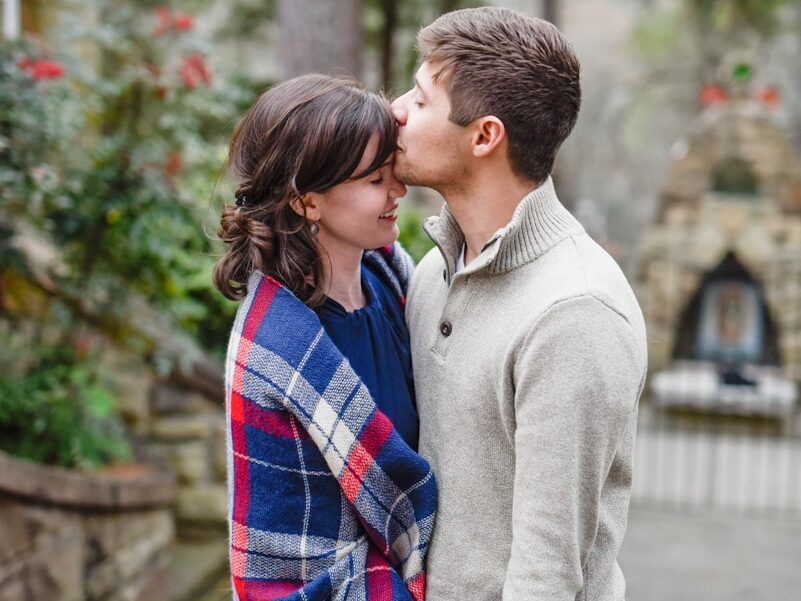
Not all love looks the same. Some people feel things deeply but never find the words. They care, but it comes out sideways—through awkward silences, missed moments, or trying too hard in all the wrong ways. If you’ve ever been left wondering how someone felt, it doesn’t always mean they didn’t love you. Sometimes, they just didn’t know how to show it.
They got nervous before seeing you.

They kept checking their reflection in the car window. Practiced what they’d say. Smiled too wide or laughed too loud once they saw you. It wasn’t confidence—it was nerves. That awkwardness wasn’t because they didn’t care. It was because they did. More than they knew how to handle. Their hands fidgeted. Their words tumbled out too fast. It was messy, but it was real. You mattered, and it showed in every anxious gesture.
They showed up when it counted.

They didn’t always have the right words, but they were there when it mattered. Brought you soup when you were sick. Waited in the ER lobby. Drove across town because you didn’t want to be alone. They weren’t expressive every day—but in the big moments, they didn’t flinch. Their presence was their way of saying, “I care.” Even when they couldn’t say it, they made sure you never had to face the hard stuff by yourself.
They remembered small things.

You once said you liked the blue gummy bears best, and suddenly, that’s all they saved for you. They avoided calling you a nickname you didn’t like. They missed anniversaries or got birthdays wrong—but they remembered the quiet stuff. The things most people forget. You’d catch it in the details—your favorite blanket on the couch, or a snack packed for later. It wasn’t grand, but it meant they were listening—even when you thought they weren’t.
They apologized in strange ways.

They didn’t say, “I’m sorry.” Instead, your car had gas the next morning. The dishes were done. It was never direct. But it was real. They fixed things instead of talking. It wasn’t perfect, but those small acts meant they were trying to make things right the only way they knew. You’d notice it later—the way your keys were moved or how the trash was already taken out. That was their version of making peace.
They were hard on themselves.

You’d say it was okay. They’d still carry it like a weight. A missed text, a wrong word, a moment they thought hurt you—they couldn’t let it go. You’d catch them staring off, running the scene back in their head. Not because they didn’t care. Because they cared too much. They weren’t shutting down—they were stuck in shame. Trying so hard not to mess things up that they forgot they were already enough.
They checked in quietly.

You wouldn’t get paragraphs or heart emojis. But you’d get a late-night meme, a song link, or a text asking if you ate. It wasn’t loud affection. It was subtle, almost easy to miss. But it was their way of saying, “I thought of you,” without needing to say more. Sometimes, they’d show up unannounced with your favorite snack. Or leave the porch light on. Their check-ins didn’t shout love—but they whispered it.
They didn’t know how to receive care.

You brought them soup when they were sick. They said, “You didn’t have to.” You asked what was wrong, and they said, “Nothing.” Letting someone take care of them felt foreign. Not because they didn’t appreciate it—but because they didn’t know what to do with it. They might’ve even looked uncomfortable. But they remembered. They noticed. And when you weren’t looking, they kept those moments close—even if they couldn’t say thank you right away.
They opened up in bits and pieces.

You’d get a story in the car. A confession right before sleep. Not the full picture—just moments. They trusted you with their soft spots, even if they couldn’t explain them. It wasn’t that they were hiding. It was that opening up was something they were still learning how to do. Each time they shared, it felt like a little door cracked open. Their vulnerability didn’t pour out—it leaked gently, and it meant everything.
They stayed longer than they needed to.

They didn’t always get it right, but they stuck around. Even on days when things felt heavy when everything you said seemed to land wrong, they stayed. They didn’t offer perfect solutions or magic words. But they were there—watching your favorite show beside you, bringing you tea in silence, sitting through the tension without walking away. That kind of love didn’t ask for credit. It just showed up again and again.
They talked about the future—carefully.

They didn’t say, “We’ll get married one day.” But they said things like, “You’d love that place,” or “Maybe we’ll try that restaurant next month.” They didn’t always plan out loud—but their hopes made space for you, quietly tucked into their version of the future. You were part of their daydreams. Not spelled out but hinted at in passing. And in those soft mentions, you saw their heart opening, slowly but surely.
They got jealous and then felt guilty about it.

They’d hear a name, see a glance, and suddenly their mood shifted. Maybe they got quiet. Maybe they changed the topic too fast. It wasn’t because they didn’t trust you—it was their fear speaking louder than reason. Afterward, they’d show up with your favorite snack or send a sweet message. Not to manipulate, but to apologize the only way they knew how.
They wanted to do better.

They asked how to be better, even if they got defensive first. They tried new things because you liked them. Remembered your coffee order after messing it up twice. They weren’t perfect—but you could see the effort. And the effort came from love. They might’ve stumbled through it—but every attempt was real. Every adjustment was for you. Not because they had to—but because they genuinely wanted to get it right.
They struggled with the words.

You said, “I love you,” and they smiled. Squeezed your hand. Maybe said, “Same here,” or changed the subject. But later, you’d find a note in your bag. Or they’d post a photo of you. They showed it—they just didn’t say it easily. Their love wasn’t in big speeches. It lived in the background—in how they looked at you, how they tried, how they stayed. And sometimes, that said more than words ever could.
They shared things they cared about.

They handed you a book they loved or played you a song that reminded them of home. They didn’t explain why it mattered—they just watched to see how you’d react. That was their way of sharing who they were in the only language they fully understood. It was trust in disguise. Letting you into their favorite memories, their quiet comforts, was how they let you into their heart.
They loved you more than they could handle.

Sometimes, their love felt like confusion. They pulled back, got distant, and acted like they didn’t care. But underneath it was fear. Not of you—but of how deeply they felt. It overwhelmed them. Loving you wasn’t the problem. Knowing how to survive that love was. They needed more time, more safety, more patience. But even in their retreat, there was something undeniable—they loved you, even when they didn’t know how to say it.

